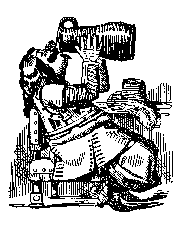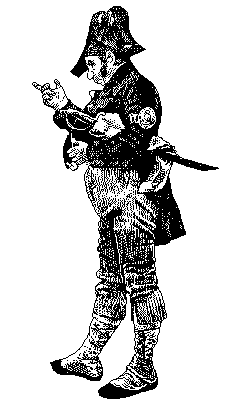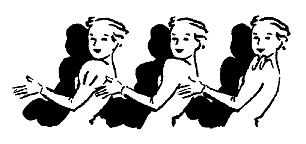
Here in New York City, They're Actually a Sort of Greenish Gray.
Dear Evan: My wife and I are curious about the source and history of the phrase "blue moon." We understand that blue moons happen only once in great while, but why "blue?" -- R.W. Quick, via the Internet.
Before I embark on my answer, let me take a moment to say how happy I am to know why
you're asking this particular question at this particular time. Often I'll receive a flurry of questions
from readers about a particular word or phrase, more or less simultaneously, leaving me to wonder what prompted
people all over the world to all suddenly ask about the origin of "skinny," for instance, or
"cockamamie." It turned out to be a Clint Eastwood thriller ("In the Line of Fire") that led to the
deluge of "cockamamie" queries a few years back, but in most cases I just have to assume that the
scriptwriters at "Baywatch" have been getting creative again.

In this case, however, I'm fairly certain that your question stems from the fact that we have recently had (June 30th, to be precise) a "blue moon" in the astronomical sense, meaning the second full moon within a calendar month. While "blue moon" has been used to mean a very rare occurrence since the late 19th century, the kind of "blue moon" we've just had is actually not that rare. Since the lunar cycle is just 29.5 days long, and most of our months are at least 30 days long, "blue moons" roll around every 32 months or so.
There is another kind of "blue moon," however. On extremely rare occasions the moon actually appears to be blue. The blue color of a true "blue moon" on these occasions is thought to be due to various dust and smoke particles suspended in the Earth's atmosphere. These "blue moons" have no connection to how many full moons there have been in that particular month, and may well not even be full moons.
Evidently, whoever decided to call the rather common phenomenon of the second full moon within a calendar month a "blue moon" didn't realize exactly how rare truly blue moons are.
Dear Evan: I used the expression "Chinese fire drill" the other day to indicate a disorganized, confused, and ineffective process. The person to whom I was speaking asked me the origin of the phrase. I diligently searched in my copy of The Morris Dictionary of Word and Phrase Origins without any luck. What say you? -- Ruth Martin, Princeton, New Jersey.
Well, I say that your first impulse was certainly sound. [Begin blatant advertisement] With more than 600 pages of the fascinating stories behind thousands of words, my parents' book (published by HarperCollins and available at fine bookstores everywhere) is certainly the logical place to look. [End blatant advertisement] Still, the English language is too big for any one book, so it's not surprising that they didn't get around to exploring "Chinese fire drill."
 Riding to our rescue comes, as he so often does, Hugh Rawson, author of
some of the most fascinating word origins books in print. In his marvelous Wicked Words, Mr.
Rawson notes that the use of the modifier "Chinese" in the derogatory sense of "confused, disorganized
or inferior" dates back to the time of World War I and was largely a British invention. Other
"Chinese" slurs of the day included "Chinese ace" (an inept aviator), "Chinese national anthem" (an
explosion) and "Chinese puzzle" (one with no solution).
Riding to our rescue comes, as he so often does, Hugh Rawson, author of
some of the most fascinating word origins books in print. In his marvelous Wicked Words, Mr.
Rawson notes that the use of the modifier "Chinese" in the derogatory sense of "confused, disorganized
or inferior" dates back to the time of World War I and was largely a British invention. Other
"Chinese" slurs of the day included "Chinese ace" (an inept aviator), "Chinese national anthem" (an
explosion) and "Chinese puzzle" (one with no solution).
"Chinese fire drill" seems to be one of the few (fortunately) of these phrases that have survived in popular usage. Aside from being a synonym for "extreme confusion," incidentally, "Chinese fire drill" is also the popular name for a prank long-beloved of college students, wherein 4 or 5 of the little matriculators stop their car at a red light, jump out, run around the car and then hop back in, the point (such as it is) being to complete the procedure before the light changes to green.
The earliest written citation for "Chinese fire drill" reported by the Random House Historical Dictionary of American Slang dates only to 1952, although William Safire is quoted as maintaining that it was commonly heard in Brooklyn just after World War I. This is not necessarily, as it would seem, a contradiction. As a former resident of Brooklyn, I can testify that Brooklynites are often decades ahead of the rest of the U.S. in the development and testing of insults. In any case, "Chinese fire drill," though today almost always used without malice, is indeed an insult to those of Chinese ancestry, and deserves to be permanently retired.
And My Cat Will Have a Grasshopper, Thanks.
Sirs, Madams: I am in dire straits with my main squeeze because I was bragging that I could find the origin of any word in the English language pronto. NOT! I cannot locate the origin of the word "cocktail"! Can you help? Any and all information you can provide me on this subject would be wonderful. "Sweating over a cocktail." -- Cecil Duncan, via the Internet.
Before we get started on your question, some necessary clarification about how this column works. There are no "Sirs" or "Madams" around here -- it's just little old me in a room full of books and a broken air conditioner. This means, in practical terms, not only that I have to mix my own drinks, but that they get warm very quickly. And now onward, before my martini evaporates.
 The American Heritage Dictionary defines "cocktail," which first appeared in the early 19th
century, as "any of various mixed alcoholic drinks consisting usually of brandy, whiskey, vodka or
gin, combined with fruit juices or other liquors and served chilled." Having left out the olive, the
AHD then goes on to comment simply "origin unknown." I think they should have said "uncertain,"
because there are so many theories about "cocktail" that one of them almost must be true, although
H.L. Mencken judged them all "fishy."
The American Heritage Dictionary defines "cocktail," which first appeared in the early 19th
century, as "any of various mixed alcoholic drinks consisting usually of brandy, whiskey, vodka or
gin, combined with fruit juices or other liquors and served chilled." Having left out the olive, the
AHD then goes on to comment simply "origin unknown." I think they should have said "uncertain,"
because there are so many theories about "cocktail" that one of them almost must be true, although
H.L. Mencken judged them all "fishy."
Leaving aside the theories that link the word to the West African word "kaketal" (scorpion, because of its "sting"), or depend on Aztec princesses named "Xoctil," or involve implausible stories of drinks stirred with rooster tails, we are left with my favorite, which has the virtue of making sense. A "cocktailed horse" is one whose tail has been bobbed, giving it a jaunty and flamboyant look. It seems reasonable that the "cocktail" took its name from the drink's alcoholic wallop, sufficient to "cock the tail" (or "knock the socks off") of an unwary patron. As I said, it makes sense to me, and I'd be willing to bet you and your "main squeeze" a round of drinks that it's true.
Dear Evan: Can you tell me where the word "galoot" comes from, as in "Ya big galoot"? I was wondering if it might have originated in the Galeutian Islands (you know, off the coast of Galaska). -- Jim Vincent, New York City.
 Very funny. I can see that I have a discipline problem among readers of this column. Maybe
you won't find this pop quiz quite so funny -- list ten of my topics from the last six months, excluding
anecdotes about my cat. You have 15 minutes. And you, out there in Wisconsin -- spit out that gum.
Very funny. I can see that I have a discipline problem among readers of this column. Maybe
you won't find this pop quiz quite so funny -- list ten of my topics from the last six months, excluding
anecdotes about my cat. You have 15 minutes. And you, out there in Wisconsin -- spit out that gum.
"Galoot" is a fine old word, meaning, according to the new Random House Compact Unabridged Dictionary, "an awkward, eccentric or foolish person," although "galoot" is usually only applied to men. Perhaps it's the influence of movies and books (I seem to vaguely remember John Wayne saying, "Ya big galoot" in some horse opera or another, and the term occurs in the Western novels of Louis L'Amour), but "galoot" has taken on the added connotation of "big dumb fellow" in the popular vernacular, so it's unlikely you'll hear "galoot" applied to a woman.
Unfortunately, no one knows exactly where the word "galoot" came from. Thanks to all those horse operas, most of us associate "galoot" with cowboys, but the term apparently was actually invented by sailors around 1812, and applied to soldiers and marines, most likely those being transported by ship. Although soldiers and marines might well face hardship and danger when they reached their destination, they were not expected to work while aboard ship. Naturally, the sailors resented the soldiers' privileged shipboard status, and the derogatory term "galoot" was probably concocted as a small but satisfying means of revenge. If so, it wasn't the only linguistic jab by the resentful sailors -- the slang term "soldier," meaning to loaf, originated in the Navy at about the same time. On dry land, on the other hand, "to soldier" means "to persevere," most often heard in the phrase "to soldier on." Not surprisingly, this more positive sense of the term is assumed to have originated in the Army.
Dear Evan: Would you happen to know the name of the little bumps of skin between the nose and the upper lip? My wife insists there is no word, but I could have sworn that there was a term for it. Do you know? -- Marc Kazen, via the Internet.
Yes, I do. Next question. Oh, you want to know what it is? Driving you a little crazy, isn't it? Let's see, now...septum? No, that's the thing separating your nostrils. Um, tibia? No, that's a bone in your leg. Weimaraner? No, that's a dog. Gosh, this is beginning to drive even me crazy, and I already know the answer.
 The envelope, please. And the answer is ... "philtrum." I have a terrible time remembering
this word myself, possibly because I had a moustache for many years and never really noticed my own
philtrum. I'm just fortunate to have had at hand a copy of a dandy book called Word Menu, by
Stephen Glazier (Random House). Mr. Glazier's book is just the ticket when you've forgotten what
something is called, because it lists more than 75,000 terms, all arranged logically by subject. To find
"philtrum," for instance, I just looked under "Anatomy; Head and Neck," and there it was, neatly
defined as the "vertical groove on surface of upper lip, below septum of nose."
The envelope, please. And the answer is ... "philtrum." I have a terrible time remembering
this word myself, possibly because I had a moustache for many years and never really noticed my own
philtrum. I'm just fortunate to have had at hand a copy of a dandy book called Word Menu, by
Stephen Glazier (Random House). Mr. Glazier's book is just the ticket when you've forgotten what
something is called, because it lists more than 75,000 terms, all arranged logically by subject. To find
"philtrum," for instance, I just looked under "Anatomy; Head and Neck," and there it was, neatly
defined as the "vertical groove on surface of upper lip, below septum of nose."
That's not a very romantic definition, but evidently many people down through the ages have considered the philtrum cuter than a bug's ear, because the root of "philtrum" is the Greek "philtron," meaning "love potion or charm." Perhaps the idea that a "vertical groove on surface of upper lip" could inflame the passions isn't so silly when one considers the effects of Kirk Douglas's cleft chin or Shirley Temple's dimples on generations of moviegoers. Still, I think a good, bushy moustache beats a shapely philtrum any day, although my wife is rather forcefully of the opposite opinion. All I know is that I woke up one morning and my faithful old moustache was gone, and I've never had the nerve to grow it back.
Oh, I remember now. It's a kind of pastry, innit?
Dear Mr. Morris: In the mystery I've just been reading ("The Seacoast of Bohemia," by Nicholas Freeling), I find: "Perhaps he was a bit stocious or perhaps it was the rather poor coordination G. had noticed earlier." In the context, the word "stocious" seems to imply a muzziness, but why can I not find it in any of the three dictionaries I own? A similar-sounding but clearly different word is "scotious," recently encountered in Elizabeth Spencer's classic 1956 novel of rural Mississippi, "The Voice at the Back Door," where a Black country woman is describing recent events to her just reappeared husband: "Us had a scotious time in this house last night. I most had to beat the stuffing out'n W.B." No point in looking in the dictionary for that, I figured, correctly. Would the word be some sort of formation from "unconscionable"? Or is that reaching? -- Jill Hellendale, Riverside, CT.
There's nothing wrong with "reaching" in a situation such as this one -- I plan to do a bit of it myself right now. Prior to receiving your letter, I had never heard either of these words, and I've had only middling success in tracking them down.
 Of the two, I had more success with "stocious" -- although, as you discovered, most
dictionaries don't include it. Both the Oxford English Dictionary and the New Shorter Oxford English
Dictionary do, fortunately, defining it as a mid-20th century Anglo-Irish slang term for "drunk."
Unfortunately, the folks at Oxford have no idea as to where or how "stocious" might have originated.
Of the two, I had more success with "stocious" -- although, as you discovered, most
dictionaries don't include it. Both the Oxford English Dictionary and the New Shorter Oxford English
Dictionary do, fortunately, defining it as a mid-20th century Anglo-Irish slang term for "drunk."
Unfortunately, the folks at Oxford have no idea as to where or how "stocious" might have originated.
"Scotious," however, is a real puzzler. I have not been able to find any record at all of this word, not even in dictionaries of Southern and African-American slang. Given that you found it in a passage where the character is speaking in a fairly intense dialect, I suspect that the word does not exist as such. The author probably wanted to portray the character as someone who either makes up her own words to fit the occasion or mangles existing words. If the latter is the case, "unconscionable" is a possible source, but I'd vote for "atrocious."